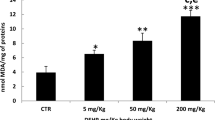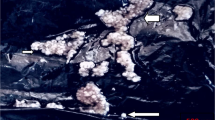Abstract
Lead acetate (PbAC) toxicity can occur by either ingestion or inhalation from contaminated surfaces or from the environment. Nigella sativa is a natural product with immense pharmacological properties, which include antioxidant, antibacterial, and antianemia properties. It has been showed to counter the effect of PbAC-induced hematological and biochemical changes in short-term studies. This study hypothesized that the N. sativa (NS) administration will ameliorate the deleterious effects of chronic PbAC toxicity in rats. A total of 75 Sprague Dawley rats were divided into three groups of 25 rats, and each group was further sub-divided into five groups of five rats each. Group 1 rats (negative control) were given distilled water, group 2 (positive control; PC) were given 10 mg/kg of lead acetate (PbAC) daily, and groups 3 (T1), 4 (T2), and 5 (T3) were each given 10 mg/kg of PbAC followed by graded concentrations of powdered seeds of NS; 100, 150, and 200 mg/kg, respectively. Five rats in each group were euthanized at 30, 60, and 90 days for collection of whole blood and selected organs. Whole blood was collected after euthanized via cardio puncture and used to evaluate the complete blood profile, while plasma was used for biochemical analysis. Tissue samples of the liver and kidney were fixed with 10% buffered formalin, processed, and stained with H&E and periodic acid–Schiff (PAS) for the liver. Aggression and fear were increased in the PbAC-exposed group and absent in the T3 group. There was a lower (p < 0.05) red blood cell count (RBC), packed cell volume (PCV), mean corpuscular hemoglobin concentration (MCHC), and lymphocyte count in the PC and T1 groups only. Biochemical analysis revealed elevated (p < 0.05) liver enzyme and creatinine levels in the PC and T1 groups on day 90 for AST and day 30 for ALT and creatinine. The level of alkaline phosphatase (ALP) was higher (p < 0.05) in the PC at 30 and 60 days of sampling. Other parameters, such as WBCs, prothrombin, urea, and cholesterol, were not significant in all groups. Histopathological lesions in the liver and kidneys were more severe in the PC and T1 groups, while the T2 and T3 groups showed mild lesions resulting from N. sativa administration. There was a decrease (p < 0.05) in the total PAS-stained area signifying glycogen depletion in the PC, T1, and T2 groups at 60 days and a higher distribution of the PAS-stained areas (p < 0.05) in the T3 group. At 90 days, the PC group had a lower (p < 0.05) distribution of PAS-stained areas in comparison to the other groups. The results showed the therapeutic potential of N. sativa extract in modulating both hematological and biochemical alterations induced by chronic lead acetate administration in rats.






Similar content being viewed by others
References
Ali BH, Blunden G (2003) Pharmacological and toxicological properties of Nigella sativa. Phytother Res 17(4):299–305. https://doi.org/10.1002/ptr.1309
Allouche L, Hamadouche M, Touabti A, Khennouf S (2011) Effect of long-term exposure to low or moderate lead concentrations on growth, lipid profile and liver function in albino rats. Adv Biol Res 5(6):339–347
Allouche L, Hamadouche M, Touabti A (2009) Chronic effects of low lead levels on sperm quality, gonadotropins and testosterone in albino rats. Exp Toxicol Pathol 61(5):503–510. https://doi.org/10.1016/j.etp.2008.12.003
Al-Rouby NM, Gawish SM (2013) Histological study on the possible protective effect of nigella sativa oil on experimentally induced hepatotoxicity in albino rats treated with sodium valproate. Glo Adv Res J of Med Med Sci 2(4):090–099
Assi MA, Hezmee MNM, Abba Y, Rajion MA, Wahid H, Yusof MSM (2017a) Assessment of therapeutic effects of Nigella sativa against chronic lead acetate-induced reproductive dysfunction in male Sprague-Dawley rats. Comp Clin Path 26(1):87–97. https://doi.org/10.1007/s00580-016-2349-3
Assi MA, Hezmee MNM, Abba Y, Sabri MY, Haron AW, Baiee FH, Rajion MA (2017b) Effect of Nigella sativa pre-treatment on sub-chronic lead acetate induced hematological and biochemical alterations. J Comput Theor Nanosci 14(6):2752–2758. https://doi.org/10.1166/jctn.2017.6565
Assi MA, Noor MHM, Bachek NF, Ahmad H, Haron AW, Yusoff MSM, Rajion MA (2016a) The various effects of Nigella sativa on multiple body systems in human and animals, pp 1–19
Assi MA, Hezmee MNM, Haron AW, Sabri MYM, Rajion MA (2016b) The detrimental effects of lead on human and animal health. Veterinary world 9(6):660–671. https://doi.org/10.14202/vetworld.2016.660-671
Awadalla EA (2012) Ameliorative effect of the crude oil of the Nigella sativa on oxidative stress induced in rat testes by cisplatin treatment. Biomedicine & Preventive Nutrition 2(4):265–268. https://doi.org/10.1016/j.bionut.2012.08.005
Bharali MR (2013) Effect of acute lead acetate exposure on liver of mice. Journal of Global Biosciences 2:121–125
Burright RG, Engellenner WJ, Donovick PJ (1983) Lead exposure and agonistic behavior of adult mice of two ages. Physiol Behav 30(2):285–288. https://doi.org/10.1016/0031-9384(83)90020-3
Dalia M (2010) Effect of using pectin on lead toxicity. J Am Sci 6:541–554
Driscoll JW, Stegner SE (1976) Behavioral effects of chronic lead ingestion on laboratory rats. Pharmacol Biochem Behav 4(4):411–417. https://doi.org/10.1016/0091-3057(76)90057-5
Elkhateeb A, El Khishin I, Megahed O, Mazen F (2015) Effect of Nigella sativa Linn oil on tramadol-induced hepato- and nephrotoxicity in adult male albino rats. Toxicol Rep 2:512–519. https://doi.org/10.1016/j.toxrep.2015.03.002
Engellenner WJ, Burright RG, Donovick PJ (1986) Lead, age and aggression in male mice. Physiol Behav 36(5):823–828. https://doi.org/10.1016/0031-9384(86)90437-3
Farrag ARH, Mahdy KA, Abdel Rahman GH, Osfor MM (2007) Protective effect of Nigella sativa seeds against lead-induced hepatorenal damage in male rats. Departments of Pathology, Department of Medical Biochemistry. Pak J Biol Sci 10(17):2809–2816
Gali-Muhtasib H, El-Najjar N, Schneider-Stock R (2006) The medicinal potential of black seed (Nigella sativa) and its components. Advances in Phytomedicine 2:133–153. https://doi.org/10.1016/S1572-557X(05)02008-8
Hala MA (2011) Protective effect of Nigella sativa, linseed and celery oils against testicular toxicity induced by sodium valproate in male rats. J Am Sci 7(5):687–693
Hegazy AM, Fouad UA (2014) Evaluation of lead hepatotoxicity; histological, histochemical and ultrastructural study. Forensic Medicine and Anatomy Research 2(03):70–79. https://doi.org/10.4236/fmar.2014.23013
Ibrahim NM, Eweis EA, El-Beltagi HS, Abdel-Mobdy YE (2012) Effect of lead acetate toxicity on experimental male albino rat. Asian Pac J Trop Biomed 2(1):41–46. https://doi.org/10.1016/S2221-1691(11)60187-1
Kocyigit Y, Atamer Y, Uysal E (2009) The effect of dietary supplementation of Nigella sativa L. on serum lipid profile in rats. Saudi Med J 30(7):893–896
Krishnan N, Muthukrishnan S (2012) Effect of Nigella sativa seed extract on carbon tetrachloride-induced hepatotoxicity in rats. Acute Med 2(4):107–113. https://doi.org/10.1016/j.jacme.2012.09.001
Mudipalli A (2007) Lead hepatotoxicity & potential health effects. Indian J Med Res 126(6):518
Murugesan M, Ragunath M, Prabu T, Nadanasabapathi S, Sakthivel M, Manju V (2012) Protective role of black cumin (Nigella sativa) on isoproterenol induced myocardial infarction in rats. Int J Pharmacol Clin Sci 1:45–53
Mustafa HN, Hussein AM (2016) Does allicin combined with vitamin B-complex have superior potentials than alpha-tocopherol alone in ameliorating lead acetate-induced Purkinje cell alterations in rats? An immunohistochemical and ultrastructural study. Folia Morphol (Warsz) 75(1):76–86. https://doi.org/10.5603/FM.a2015.0076
Othman AM, Abba Y, Jesse FFA, Ilyasu YM, Saharee AA, Haron AW, Zamri-Saad M, Lila MAM (2016) Reproductive pathological changes associated with experimental subchronic Corynebacterium pseudotuberculosis infection in nonpregnant boer does. J Pathog 2016:1–7. https://doi.org/10.1155/2016/4624509
Papanikolaou NC, Hatzidaki EG, Belivanis S, Tzanakakis GN, Tsatsakis AM (2005) Lead toxicity update. A brief review. Med Sci Monit 11(10):RA329–RA336
Rangan GK, Tesch GH (2007) Quantification of renal pathology by image analysis (methods in renal research). Nephrology 12(6):553–558. https://doi.org/10.1111/j.1440-1797.2007.00855.x
Rastogi SK (2008) Renal effects of environmental and occupational lead exposure. Indian Journal of Occupational and Environmental Medicine 12(3):103–106. https://doi.org/10.4103/0019-5278.44689
Saleem U, Ahmad B, Rehman K, Mahmood S, Alam M, Erum A (2012) Nephro-protective effect of vitamin C and Nigella sativa oil on gentamicin associated nephrotoxicity in rabbits. Pak J Pharm Sci 25(4):727–730
Salem ML (2005) Immunomodulatory and therapeutic properties of the Nigella sativa L. seed. Int Immunopharmacol 5(13):1749–1770. https://doi.org/10.1016/j.intimp.2005.06.008
Weisbroth SH, Flatt RE, Kraus AL (2013) The biology of the laboratory rabbit. Academic Press
Yaman İ, Balikci E (2010) Protective effects of Nigella sativa against gentamicin-induced nephrotoxicity in rats. Exp Toxicol Pathol 62(2):183–190. https://doi.org/10.1016/j.etp.2009.03.006
Author information
Authors and Affiliations
Contributions
All authors contributed equally to this work.
Corresponding author
Ethics declarations
Ethical statement
The animal experimental protocol used in this study was approved by the Institutional Animal Care and Use Committee (IACUC) with reference number UPM/IACUC/AUP-R047/2015, in accordance with the standard guidelines on usage and care of laboratory animals. The animals were humanely handled and euthanized at stipulated dates (30, 60, and 90 days) during the experimental period, using CO2 asphyxiation method after anesthesia procedure with ketamine + xylazine (50 mg/kg + 10 mg/kg body weight).
Conflict of interest
The authors declare that they have no conflict of interest.
Rights and permissions
About this article
Cite this article
Assi, M.A., Abba, Y., Abdulkhaleq, L.A. et al. Effect of powdered seed of Nigella sativa administration on sub-chronic and chronic lead acetate induced hemato-biochemical and histopathological changes in Sprague Dawley rats. Comp Clin Pathol 27, 705–716 (2018). https://doi.org/10.1007/s00580-018-2655-z
Received:
Accepted:
Published:
Issue Date:
DOI: https://doi.org/10.1007/s00580-018-2655-z




